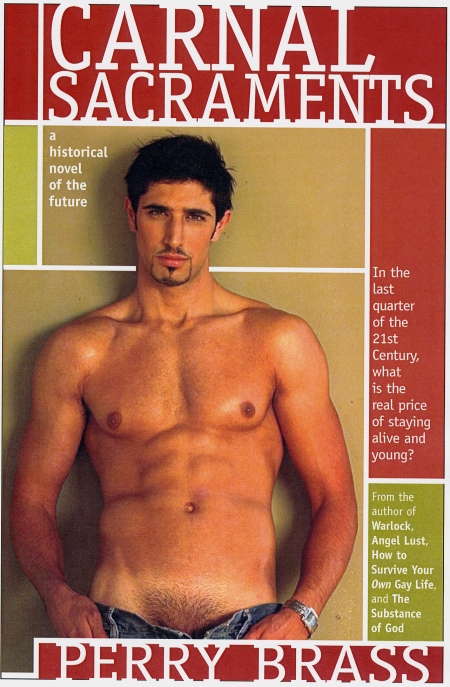Last weekend, one of my friends in San Francisco alerted me that Jim Provanzano, the arts editor at Bay Area Reporter, had written a favorable review of Carnal Sacraments in the latest issue.
I was delighted—Belhue Press had sent a review copy to Provanzano, and I had hoped that he’d review the book. Bay Area Reporter is one of the best lgbt papers in the country, and is the “newspaper of record” for the gay and lesbian community of San Francisco—so I’d had my fingers crossed about a review.
Getting books reviewed nowadays is not easy, especially since in the pecking order of queer writers, I make Kathy Griffith’s “My Life on the ‘D’ List” look waaay out there. If she’s on the “D” list, I must be on the X-Y-Z list. I’m not a celeb; I’ve never outed a Republican congressman or a closeted, fundamentalist preacher; I’m not a major league baseball player (I know, you’re all waiting for Derek Jeeter to jeet himself, but it seems like it ain’t happenin’ yet); and I’m not a star in Mixed Martial Arts (which may become my new fascination: imagine a sport where two incredably hot guys hug each other close, keep almost balls-to-balls body contact, and then throw a crazy few punches at one another—who’d-a-thunk it?)—anyway, I’m none of that. I’m just a . . . OK, I’m a good writer, I know that. False modesty is not part of my paraphenalia.
But I was pleased as all get-up at the review, so just in case you’ve missed it, here’s Jim Provanzano’s take on Carnal Sac:
Minority retort: Futuristic executive makeovers & breakdowns
[review] Published 08/23/2007
by Jim Provenzano
Carnal Sacraments by Perry Brass; Belhue Press, $16.95
Set at the end of this century, Perry Brass’ Carnal Sacraments tells the story of Jeffrey Cooper, a design executive who’s reached the pinnacle of his career, which involves supervising global marketing campaigns for superfluous luxury products.
Few know how long it took Cooper to climb his way to the top. As with many other elites in this dystopian world, while appearing to be a dashing 30something, Cooper is actually in his 70s. A regimen of injections, surgeries and other processes keeps his youthful appearance. Underneath the facade, however, Cooper is about to suffer a nervous breakdown, particularly when a lumbering stranger punches him on the subway.
His later coincidental meeting with his assailant, a Dutchman named John van der Meer, leads to a strange and passionate affair that may ruin his precarious status as a tastemaker for the world.
Set mostly in Berlin, where the Arkansas-born Cooper works, the book’s conversations and nicknames are sprinkled with German terms. (A glossary is provided, but mostly unnecessary, with the phrases understandable in context.)
Unlike most other science fiction novels, despite some teleconferences and the expected Orwellian government surveillance, Brass dispenses with futuristic jargon, gadgets and machinery in his novel. He instead focuses on the inner paranoia of an upscale executive fearing his inevitable downfall.
Although set in a future where the government has become a corporate voyeur of every aspect of middle- to high-income citizens, leaving the lower classes to barely documented yet surveilled status, Brass’ novel, like most good “futuristic” fiction, actually comments on contemporary society. Cooper’s wealthy gay friends, up-ended by illness, are forced into a government-controlled frozen status. John, Cooper’s love interest, is relegated to poverty, living in a shack in a forest outside of Berlin.
Cooper gushes with neurotic emotion and pent-up frustration with his “system-assigned” therapist, who warns him of the potential dangers of his romance with John.
Then, in an impulsive gesture, Cooper accepts an invitation from a scheming yet supercilious younger executive in India. Cooper and new mysterious lover embark on a mystical yet conflict-laden vacation. More dark secrets are revealed, and Cooper’s limits and capacity for love versus his grasp on his career are tested.
Layered with philosophical elements, fascinating descriptions, and a clear focus on character overall, Brass’ latest work is one of the most unusual novels I’ve read in years.
[end of review]
Wow, that was good to read! There were a few ickies: like Jeffrey Cooper is from Alabama, not Arkansas—but why quibble? He got the book, and I’m very happy. You can learn more about Carnal Sacraments, why it took so long to come out, and why you must buy the book at my website, www.perrybrass.com. Or, even better, just get the book at Amazon, or your local lgbt bookstore [Frankly, as a gay writer, I’d prefer you get it there; but if there’s none around you, you can do Amazon]. It’s only $16.95 retail, which is about the price of 3 beers at any joint in the country now, or one and a half mojitos, or a Big Mac and a mojito—anyway, life is short, books are still cheap, and for the cost of a ticket to a crappy movie at some noisy mall, you can take me home with you, snuggle up and enjoy “one of the most unusual novels I’ve read in years.”
Thanks for your time. Keep them cards and letters a-comin’. Yours, Perry
